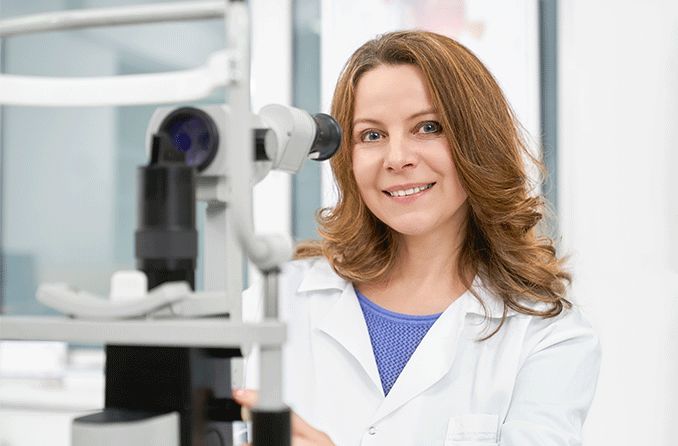What is a neuro-ophthalmologist?

A neuro-ophthalmologist is an eye doctor who deals with vision or eye problems associated with conditions of the brain and nervous system. So, for example, a neuro-ophthalmologist would be called to examine an individual who is experiencing vision loss following a brain injury or a patient who has difficulty controlling their eye movements.
In order to become a neuro-ophthalmologist, one must be certified in ophthalmology and neurology. The certification ensures that the doctor has significant knowledge and expertise in problems affecting both the eyes and the nervous system.
SEE RELATED: Optometrist vs. Ophthalmologist
Conditions a neuro-ophthalmologist treats
While neuro-ophthalmologists can diagnose and treat many conditions, the most common issues they deal with include:
Inflammation of the optic nerve (optic neuritis)
Vision loss caused by a brain tumor or stroke
Abnormal eye movements (nystagmus or strabismus)
Swelling of the optic nerve (papilledema)
Drooping eyelids (ptosis)
Chronic eye twitching (blepharospasm)
Different sized pupils (anisocoria)
Optic atrophy (loss of nerve fibers in the optic nerve)
Synkinesis (impairment of the normal function of the eyes or facial muscles)
Outside of these conditions, there are certain symptoms that may lead an eye doctor to refer a patient to a neuro-ophthalmologist, including:
Sudden, unexplained loss of vision
Reduced or blurred vision
Double vision (diplopia)
Blind spots
Other persistent vision disturbances
SEE RELATED: Akinetopsia
What happens during a neuro-ophthalmology exam?
The nervous system, according to the National Institute of Health, is made up of two parts:
The central nervous system, which includes the brain and spinal cord
The peripheral nervous system, which includes all the nerves that branch off of the spinal cord and extend throughout the body
With that in mind, the Review of Optometry explains that a neurologic exam can be broken up into five steps:
Mental status exam
At the beginning of the exam, the eye doctor will typically ask you a series of simple, casual questions. While this generally seems like natural conversation to the patient, eye doctors do this to assess whether the patient is alert and oriented.
If a patient is giving strange answers to questions, not giving answers at all, or acting confused, the eye doctor may choose to give them a mini mental status exam (MMSE). A MMSE is a quick questionnaire that assesses different facets of cognitive function like language, orientation and recall.
Cranial nerve testing
The brain has twelve pairs of cranial nerves that make different functions possible. Examples of these functions include vision (cranial nerve #2), pupil restriction and eyelid elevation (cranial nerve #3), and ocular mobility (cranial nerve #4).
During a routine eye exam, cranial nerves 2, 3, 4 and 6 are evaluated. Neuro-ophthalmological exams will test other cranial nerves to determine if an issue is present in the brain and, if so, where it’s located. Cranial nerves are located in different regions of the brain, so if the function of one or more cranial nerves is affected, it can help neuro-ophthalmologists map where the problem may be.
SEE RELATED: Abducens nerve
Motor reflex evaluation
A neuro-ophthalmologist may check for tremors, tics or muscle weakness that could indicate a neurological issue that could affect eye movements and position.
Coordination
Tests of coordination — such as quickly touching your nose, then the doctor’s fingertip, then your nose again — also may be included during a neuro-ophthalmology exam to see if there may be neurological problems that could cause eye movement problems like nystagmus.
General sensory exam
A neuro-ophthalmologist may also check your ability to sense pressure, touch and other sensations to help evaluate your overall neurological health.
SEE RELATED: Ophthalmic technician
Preparing for a neuro-ophthalmology exam
Before going in for your neuro-ophthalmologic exam, it’s important to get the necessary paperwork together to help the doctor gain a better understanding of your history.
Some things you can do to prepare for your exam include:
Find out if you will have your pupils dilated during the exam. If so, bring sunglasses and make arrangements to have someone drive you home afterward. Dilation can last up to four hours and can cause light sensitivity and blurriness that affect driving.
Have your eye doctor send the medical records of your latest eye exam to the neuro-ophthalmologist’s office.
Make a list of all medications you are taking, including over-the-counter and prescription drugs. Include the name, dosage, how long you’ve been taking the medication and whether it was prescribed or not. Bring the list with you to the appointment.
If you’ve had an MRI or CT scan performed in the past, obtain the actual films and bring them to the appointment. Better yet, have the office where the scans were performed mail them to the neuro-ophthalmologist.
It’s best to complete the items listed above a few days before your scheduled exam. This ensures that your neuro-ophthalmologist has everything they need and your appointment goes smoothly.
Before you see a neuro-ophthalmologist
It's important to note that you should see your regular eye doctor for a comprehensive eye exam before seeking care from a specialist. A comprehensive eye exam will help determine if you need specialized care, as well as what kind of specialist you might need. Many times, specialists require a referral from your regular eye doctor.
Page published on Monday, December 14, 2020






